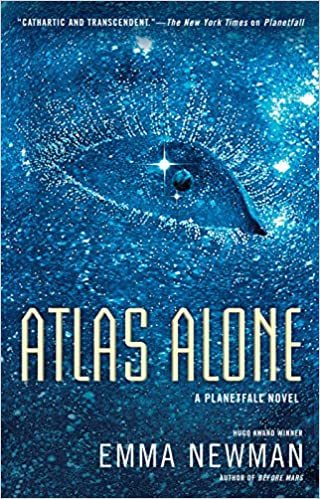Before Mars is the third book in Emma Newman’s loosely related Planetfall
series. Curiously, I still have not read the titular first book in the series, Planetfall. There are a number of reasons for that, but the primary one is that despite having the most number of ratings (11,056) and reviews (1,654) on Goodreads of any of the books in the series, Planetfall also has the lowest average rating, 3.72, which is slightly lower than the 3.75 threshold that I typically use for deciding on whether to start reading a new book. With that said, since I have now read the other books in the series, curiosity will almost certainly lead me to conclude the series by reading the work that was written and published first.
Regarding reading order, the author
herself says that the Planetfall books can be read in any order. I'm actually
not sure I agree with this view that it would lead to the optimal enjoyment of the
series. The events of Book 3, Before Mars, and Book 4, Atlas Alone, clearly happen after most of the events of
Book 2, After Atlas, and the events of Book 3 and Book 4 overlap somewhat so that these two
can be read in any order. Clearly, the events of Book 1, Planetfall, happen before the other
three books, but since its primary event (the Pathfinder project leaves Earth
on the Atlas spaceship on an interstellar journey to “find God” out among the
stars) is referred to in each of the subsequent books in the series, this means
that Book 1 can be read at any time. Books 2 and 4 are the ones where there's a
definite causal relationship that precludes reading them in a different order.
I know this is a bit long, but I think I have talked myself into recommending this reading order: 1, 2, 4, 3.
(This is roughly the temporal order in which the events depicted in each book
occur.) I also think that books 3 and 4 can be read in any order but must come
after book 2. After I read Book 1 I will discuss whether it would be best read
before or after the other 3. My reading order will have been 2,4,3,1.
This review is about book 3, Before Mars, which I think is the most effective of the four books. The story in Before Mars is told from the perspective of Anna Cubrin, a geologist and painter.
Cubrin is the latest addition to a small group of specialists at a Mars base named
Principia that is exclusively run and operated by people loyal to Stefan Gabor, a
multi-billionaire who I'm pretty sure is one of the rare characters who has a speaking role in all four books.
Cubrin is the prototypical unreliable narrator; we discover that her father experienced some kind of mental collapse that led to a near-fatal attack on his wife/Anna’s mother and his subsequent incarceration. As soon as Cubrin arrives at Principia, strange things start to happen which causes her to question her grip on reality and it is during this period that her father’s mental problems are revealed to the reader, as well as Cubrin's fervent wish that the mental collapse that happened to him will not happen to her too. By centering Cubrin’s mental state so early, the author makes it clear that Before Mars will be more of a psychological thriller than its preceding books. The reader also begins to question whether how well Cubrin’s perception of events jibes with reality, which is what the character also does.
The vast majority of the content of Before Mars either takes place in Cubrin’s head or is
communicated to the reader in her voice. Oftentimes, this literary device would be unappealing to me but the circumstances here are so unusual and the character is so unlike others that I have spent time with in the first-person in a science fiction story that this time it kept me engrossed in the book.
As the plot proceeds the reader
gets more and more examples of things that are not what they seem at Principia,
and we also learn more about the other members of the Principia team. We also
learn more about Cubrin’s relationship with her husband and infant daughter
that she left on Earth and spent 9 months traveling to the red planet to be on
Gabor’s payroll to produce paintings of Mars that he intends to send exclusively to private collectors. When events come to a head towards the end of the book
(reflecting the effects of events that happened at the end of Book 2), the
emotional impact on the reader is immense.
Overall, I think Before Mars is the best of the three Planetfall books I have read so far because while it still contains the technological advances of the other books (machine-neural interfaces that allow artificial intelligence to directly monitor bodily functions and mental well-being; augmented virtual reality called “immersives”; and interplanetary space travel) it has a more compelling (if less likable) central character in Anna Cubrin than Book 2's Carlos Moreno and does a better job of being a psychological thriller than Book 2 did in being a police procedural murder mystery. However, I definitely am curious to see what genre categories Book 1 (Planetfall) straddles and to find out how well it is done.
Title: Before Mars (Planetfall, #3).
Author: Emma Newman.
Format: Kindle.
Length: 352 pages.
Publisher: Ace Books.
Date Published: April 17, 2018.
Date Read: April 13, 2023.
OVERALL GRADE: A- (3.67/4.0).
PLOT: A-.
IMAGERY: A-.
IMPACT: A-.
WRITING: A-.


